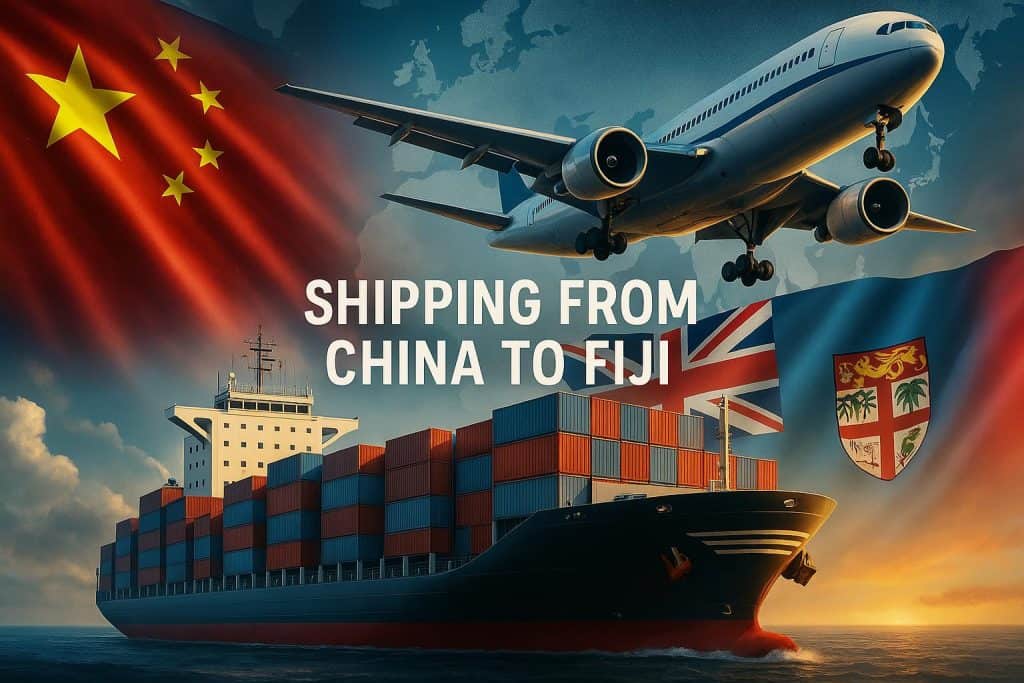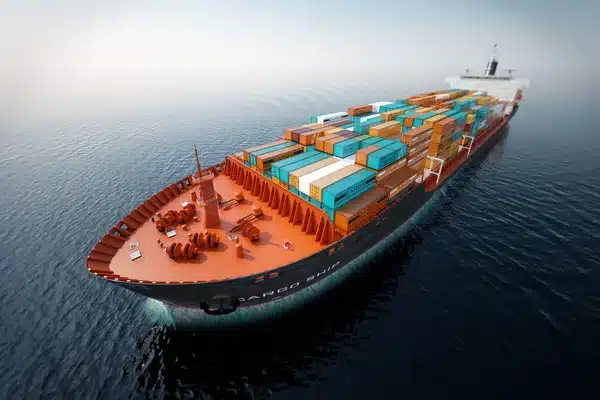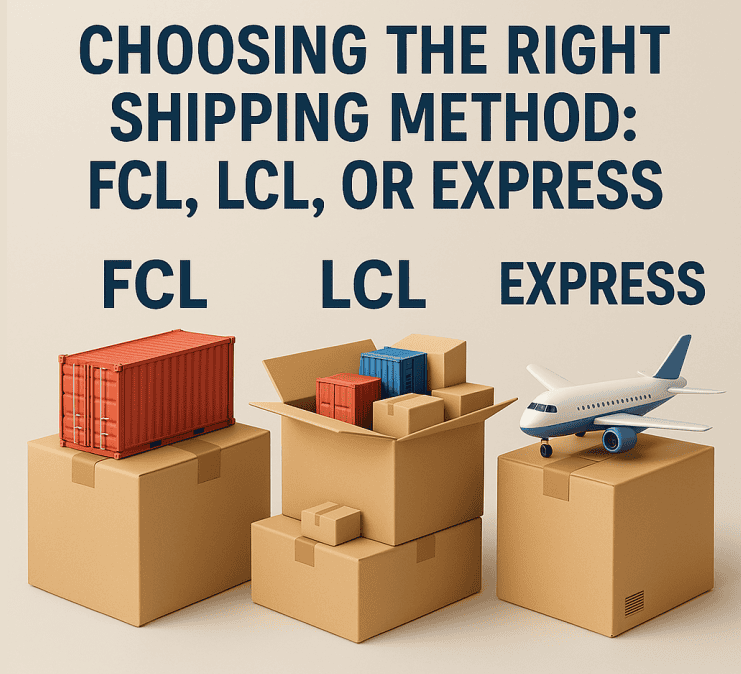Reliable & Cost-Effective Shipping from China
Tailored Logistics Solutions for Your Business
- Home
- »
- Company News
- »
- Shipping Cost from China to Fiji
Shipping Cost from China to Fiji
- L. Liu
Are you looking for the best shipping options to get your products from China to Fiji at competitive rates? Whether you’re handling bulk shipments, small parcel shipping, or a full container load, understanding the shipping process and associated shipping costs is essential for a smooth logistics experience.
At Tonlexing, we specialize in helping businesses and individuals manage international shipping from China to destinations across the South Pacific, including Suva Port and Lautoka Port. With our expertise in air freight, sea freight, and door-to-door shipping services, we ensure your goods arrive safely and on time, every time.
In this guide, we’ll walk you through everything you need to know about shipping from China to Fiji, including methods, timelines, customs procedures, and how to get the most cost-effective and reliable delivery possible.

Popular Shipping Methods from China to Fiji
When it comes to shipping from China to Fiji, there are several reliable shipping methods to choose from. The most commonly used are air freight and sea freight, depending on your cargo type, urgency, and budget.
Air Freight is ideal for urgent shipments or high-value goods. With fast delivery times and access to major airports near Suva Port, it ensures timely delivery and is widely used for commercial invoices involving light or fragile items.
Sea Freight offers the most cost-effective solution for full container load (FCL) or less than container load (LCL) cargo. It’s perfect for businesses shipping heavy or bulky items or managing larger shipments. Our container shipping services include options for both 20ft and 40ft containers.
We work with trusted shipping companies and freight forwarders to streamline the customs clearance process, reduce delays, and ensure your goods arrive safely. Whether you need international express, door-to-door, or DDP (Delivered Duty Paid) service, Tonlexing offers tailored shipping services designed to meet your needs.
Choosing the Right Shipping Method from China to Fiji
Selecting the appropriate shipping method is essential for businesses aiming to optimize both cost and delivery speed when importing from China to Fiji. The most common methods include air freight, sea freight, LCL shipping, and express shipping. Each has unique advantages depending on your shipment’s urgency, volume, and budget.
For time-sensitive shipments, air cargo ensures timely delivery, often within 3–7 days, making it ideal for high-value or lightweight goods. On the other hand, sea freight is the preferred option for bulk shipments and heavy or bulky items, offering more cost-effective rates, especially when using a full container load (FCL) or less than container load (LCL) depending on cargo size.
Additionally, for small sample orders or e-commerce goods, international express services such as DHL, UPS, or FedEx provide reliable door-to-door shipping, including real-time tracking and faster customs handling. This is an excellent choice when you need secure delivery in the shortest timeframe.
Working with experienced freight forwarders and shipping companies will help determine the best solution for your logistics strategy—balancing cost, speed, and efficiency.
Understanding Shipping Costs from China to Fiji
The shipping cost from China to Fiji varies based on several factors, including the shipping method, cargo type, weight, dimensions, and delivery speed. Whether you’re using air freight, sea freight, or international express, each option comes with distinct shipping rates.
For air freight, prices typically range between $3 and $6 per kilogram, depending on the route and service speed. This is a suitable option for smaller, urgent shipments where timely delivery is critical. For example, urgent deliveries of electronics or time-sensitive documents benefit from the speed of air transportation.
Sea freight is generally more cost effective for larger or bulk shipments, especially when using full container load (FCL). A 20-foot container from Shenzhen to Suva Port might cost around $1,300–$1,800, while a 40-foot container could range from $2,000–$2,700. For smaller volumes, LCL shipping offers the flexibility of sharing space within a container, minimizing expenses for lower-volume cargo.
It’s also important to factor in customs clearance fees, cargo insurance, packing lists, and commercial invoices when calculating total shipping costs. Businesses should work with reliable freight forwarders to get accurate and transparent quotes that cover all potential shipment expenses.
Transit Time from China to Fiji
The transit time when shipping from China to Fiji depends largely on the shipping method selected. If you need goods delivered quickly, air freight or international express services offer the fastest turnaround, typically ranging from 3 to 7 days. This is ideal for urgent shipments, parcel shipping, or high-value goods that require timely delivery and secure delivery.
For larger volumes or bulky items, sea freight is the more economical option, although shipping time is longer. Typically, ocean freight from ports such as Shenzhen, Ningbo, or Shanghai to Suva Port or Lautoka Port takes around 18 to 28 days, depending on the carrier schedule, customs clearance, and weather conditions. In some cases, delays may occur due to port congestion or documentation issues, making planning and proper coordination essential.
Working with trusted carriers and experienced shipping companies helps ensure your shipment stays on schedule. These providers offer real-time tracking and insights into your shipment’s progress, making it easier to manage expectations and meet delivery deadlines.
For businesses looking to optimize their logistics processes, understanding average transit times and planning ahead is crucial for maintaining supply chain efficiency and customer satisfaction.

Shipping Rates from China to Fiji
Understanding the shipping cost from China to Fiji is crucial for planning your import budget. Shipping charges depend on several factors, including the shipping method, container load, destination port, cargo type, and seasonality.
Here’s a general breakdown of shipping rates based on 2025 estimates:
Air Freight Rates (per kg)
Weight Range | Rate (USD/kg) | Transit Time |
|---|---|---|
45–99 kg | $5.50 – $7.20 | 5–8 days |
100–300 kg | $4.20 – $6.80 | 4–7 days |
300–500 kg | $3.80 – $6.50 | 4–6 days |
500+ kg | $3.00 – $6.00 | 3–5 days |
Air freight is best for urgent delivery, high-value items, or sensitive cargo where timely delivery is essential. While more expensive than sea freight, it’s still a cost-effective option when delays would cause greater losses.
Sea Freight – FCL (Full Container Load)
Container Size | Route | Cost (USD) | Transit Time |
|---|---|---|---|
20ft FCL | Shenzhen → Suva Port | $1,300 – $1,800 | 18–24 days |
40ft FCL | Ningbo → Lautoka Port | $2,300 – $2,700 | 20–28 days |
Full container load (FCL) shipments are ideal for bulk shipments or larger shipments, offering better competitive pricing per unit. Shipping an entire container gives better control and safety for your goods.
Sea Freight – LCL (Less than Container Load)
Volume | Rate (USD/CBM) | Transit Time |
|---|---|---|
1–5 CBM | $60 – $100 | 20–28 days |
6+ CBM | $50 – $80 | 20–28 days |
LCL shipping is suitable for smaller volumes. Though slightly slower, it provides access to container shipping without the need to book an entire container, making it a preferred shipping option for startups or first-time importers.
Tonlexing offers transparent pricing, flexible shipping options, and bundled shipping services that simplify the entire process—from commercial invoices to customs declaration.
Customs Clearance and Import Duties in Fiji
When importing goods into Fiji, understanding the customs clearance process and applicable customs duties is essential for avoiding delays and ensuring compliance with local laws. Fiji’s international shipping regulations require importers to provide accurate documentation and follow proper import procedures.
Required Documentation
To ensure your shipment is cleared efficiently, you’ll need:
Commercial invoice: stating the value, description, and quantity of the goods shipped
Packing list: with carton dimensions and weight
Bill of lading (for sea freight) or airway bill (for air freight)
Import permit (if required for medical devices or cosmetic products)
Any relevant product labels or certifications for regulated items
Proper packing lists and documentation not only support timely delivery but also help the customs authorities calculate your import duty accurately.
Calculating Import Duties
Fiji applies import tariffs based on the CIF value (Cost + Insurance + Freight). The average import duty rate is around 5–15%, depending on the product type. Additional taxes, such as VAT (currently 15%), may also apply.
Example:
If your beauty equipment shipment has a CIF value of $10,000 and a 10% duty rate, the total customs duties would be $1,000, plus $1,650 VAT.
Clearance Timeline and Tips
Most customs clearance is completed within 1–3 business days if documents are accurate
Hiring a licensed customs broker helps streamline the process
Ensure your items comply with any specific regulations, such as for cosmetics from China or skincare products
Tonlexing provides expert support for customs declaration, ensuring full compliance and helping you avoid costly shipping delays or rejections.
Choosing the Right Shipping Method: FCL, LCL, or Express
When deciding how to ship your goods from China to Fiji, choosing the right shipping method is crucial for balancing cost, delivery speed, and reliability. The three main shipping options to consider are Full Container Load (FCL), Less than Container Load (LCL), and Express Shipping.
Full Container Load (FCL)
Full Container Load (FCL) is the most cost-effective option when shipping large quantities or bulky items. You get exclusive use of an entire container, which reduces the risk of damage and can ensure a faster delivery. This method is ideal for businesses dealing with large shipments such as medical-grade beauty equipment or laser treatment equipment.
Common container sizes: 20ft (33 CBM), 40ft (67 CBM)
Best for: Heavy or bulky items
Benefits: More predictable transit times, secure delivery
Less than Container Load (LCL)
For smaller shipments or businesses importing low-volume goods, LCL allows you to share container space with other importers, making it more cost-effective. This option is great for companies that are testing new products or shipping small batches, such as cosmetic products.
Best for: Small to medium-sized shipments
Benefits: Lower cost upfront, more flexibility
Considerations: Slightly longer shipping times due to consolidation with other shipments
Express Shipping
If you need fast delivery, express shipping is the solution. Services like DHL, UPS, and FedEx offer express shipping from China to Fiji, often delivering in as little as 3–7 days. This option is perfect for urgent shipments, samples, or when you need to quickly restock inventory.
Best for: Urgent shipments, parcels under 10kg
Benefits: Fastest shipping method, reliable tracking
Considerations: Higher cost per kg, ideal for time-sensitive deliveries
How Tonlexing Helps
Tonlexing can assist you in evaluating and selecting the best shipping option based on your specific needs—whether it’s FCL, LCL, or express shipping. We ensure that your shipments arrive safely and on time, optimizing your logistics costs and meeting your deadlines efficiently.
To find out about shipping costs from China to the rest , you can click:
Cost of Shipping 20ft and 40ft Containers from China to New Zealand
20ft & 40ft Container Shipping Costs from China to Kenya
20ft & 40ft Container Shipping Costs from Taiwan to the USA
Shipping Costs for 20ft & 40ft Containers from China to Russia

Shipping Costs and Additional Considerations
Shipping costs from China to Fiji can vary greatly depending on the method chosen, the size of the shipment, and the time of year. Below is a general breakdown of shipping costs and additional considerations for FCL, LCL, and express shipping.
Shipping Costs Breakdown
Full Container Load (FCL)
FCL offers the most competitive rates when shipping larger volumes. The cost of FCL depends on the size of the container (20ft or 40ft) and the route taken. Here’s an overview:
20ft Container: Typically ranges between $1,100 to $2,500 depending on the route.
40ft Container: Generally costs around $1,400 to $3,500.
FCL rates are more predictable, as you’re paying for an entire container, which eliminates the risk of fluctuating rates due to consolidation.
Less than Container Load (LCL)
For smaller shipments, LCL is the more economical option. However, there are additional charges involved due to the consolidation of goods. LCL shipping typically costs:
Per CBM: Costs can vary from $50to $80 per cubic meter based on the volume and specific route.
LCL shipping is ideal for businesses testing new products or when dealing with smaller orders. The disadvantage, however, is the slightly longer transit time, as goods must be consolidated at both the origin and destination ports.
Express Shipping
For urgent shipments, express services like DHL, UPS, and FedEx offer fast and reliable delivery, typically within 3-7 days. However, express shipping comes at a premium price:
Per kg: Costs generally range from $5.50 to $12 per kilogram, depending on the weight and urgency.
While express shipping offers the quickest delivery, it may not be the most cost-effective solution for larger or less time-sensitive shipments.
Additional Shipping Considerations
In addition to shipping costs, several other factors should be considered when planning your shipment:
Customs Clearance: Duties and taxes must be paid upon arrival in Fiji. These are typically calculated based on the customs value of the goods (including the cost of the goods, shipping, and insurance). It’s important to work with a licensed customs broker to ensure smooth clearance and avoid delays.
Cargo Insurance: Protecting your shipment with cargo insurance is highly recommended, especially for high-value goods like beauty equipment or cosmetics. Insurance costs typically range from 1-3% of the total value of the goods being shipped.
Shipping Time and Transit: Depending on your shipping method, delivery times can range from 3-7 days for express shipping to 15-35 days for sea freight. Be sure to factor in potential delays due to seasonal congestion, port processing times, or customs procedures.
Tips to Reduce Shipping Costs
Shipping costs can add up, especially when importing goods like beauty equipment or cosmetic products in large quantities. Here are a few strategies to reduce your overall shipping expenses:
Consolidate Shipments: If possible, consolidate smaller shipments into a larger one to take advantage of FCL rates rather than paying for multiple LCL shipments.
Choose the Right Shipping Time: Avoid peak shipping seasons, such as around major holidays, to reduce the chances of encountering delays or higher rates.
Negotiate with Freight Forwarders: Work closely with your freight forwarder to secure better rates, especially if you’re shipping on a regular basis or in larger quantities.
Use a Trusted Partner: Partnering with a reliable freight forwarder like Tonlexing can help streamline your logistics, reduce unexpected costs, and ensure efficient transit.
Frequently Asked Questions (FAQ)
What are the most efficient shipping options from China to Fiji?
The most efficient shipping options depend on your cargo, urgency, and budget. Air cargo is the preferred choice for urgent delivery, ensuring timely delivery of smaller or high-value items. For larger shipments, sea transportation through ocean freight is the best value, offering reliable services at lower costs for bulky goods or oversized items.
How long does shipping take from China to Fiji?
Average transit times vary based on the shipping method. Air cargo typically takes 3 to 7 days, making it ideal for time-sensitive shipments. Sea freight, depending on the port and route, takes 18 to 28 days. It’s essential to factor in potential delays caused by weather or customs procedures.
What factors influence shipping costs from China to Fiji?
Shipping costs are determined by several factors, including cargo type, shipping method, dimensions, weight, and the route chosen. For example, air freight is faster but more expensive, while ocean freight is more cost-effective for bulk shipments. Customs declaration fees, packing lists, and any required insurance should also be considered when calculating the total cost.
How do I choose the best shipping method for my needs?
Choosing the right shipping method involves evaluating the urgency of your shipment, its size, and budget. Many businesses opt for air cargo when they need urgent delivery and reliable, fast shipping. However, sea freight offers a reliable, cost-efficient solution for transporting large volumes of goods to new markets or for oversized items.
What is the customs process for shipping goods to Fiji?
The customs declaration process in Fiji involves providing documentation such as the commercial invoice, packing lists, and the bill of lading. Ensuring your goods comply with local regulations will help speed up the process. It’s important to work with a reliable shipping partner to navigate customs efficiently and avoid delays.
Can Tonlexing help with shipping from China to Fiji?
Yes! At Tonlexing, we offer an extensive network of transportation services to meet all your shipping needs. Whether you need air cargo for urgent delivery or ocean freight for bulk shipments, we provide efficient logistics solutions that ensure your goods arrive safely and on time. Our customer-centric approach ensures we understand your specific needs and provide the best value for your shipping requirements.
Conclusion
In conclusion, whether you’re shipping valuable goods, oversized items, or exploring new markets, choosing the right shipping method from China to Fiji is crucial to ensuring efficiency and cost-effectiveness. With Tonlexing’s reliable services, you can trust that your shipment will be handled professionally every step of the way. We offer the most efficient logistics solutions with air cargo for urgent deliveries and ocean freight for larger shipments, providing you with valuable insights and flexible shipping options.
By choosing us, you benefit from our extensive network and decades of experience in managing sea transportation and Fijian shipping needs. We are committed to providing reliable, timely delivery services that meet your requirements. Our goal is to offer the best value by ensuring that your goods are transported seamlessly across the South Pacific, with average transit times and shipping costs clearly outlined.
At Tonlexing, we make transporting goods from China to Fiji a smooth and hassle-free process, no matter the size or urgency of your shipment. Contact us today to discuss your shipping needs and let us provide you with the most efficient and effective solution for your business.

